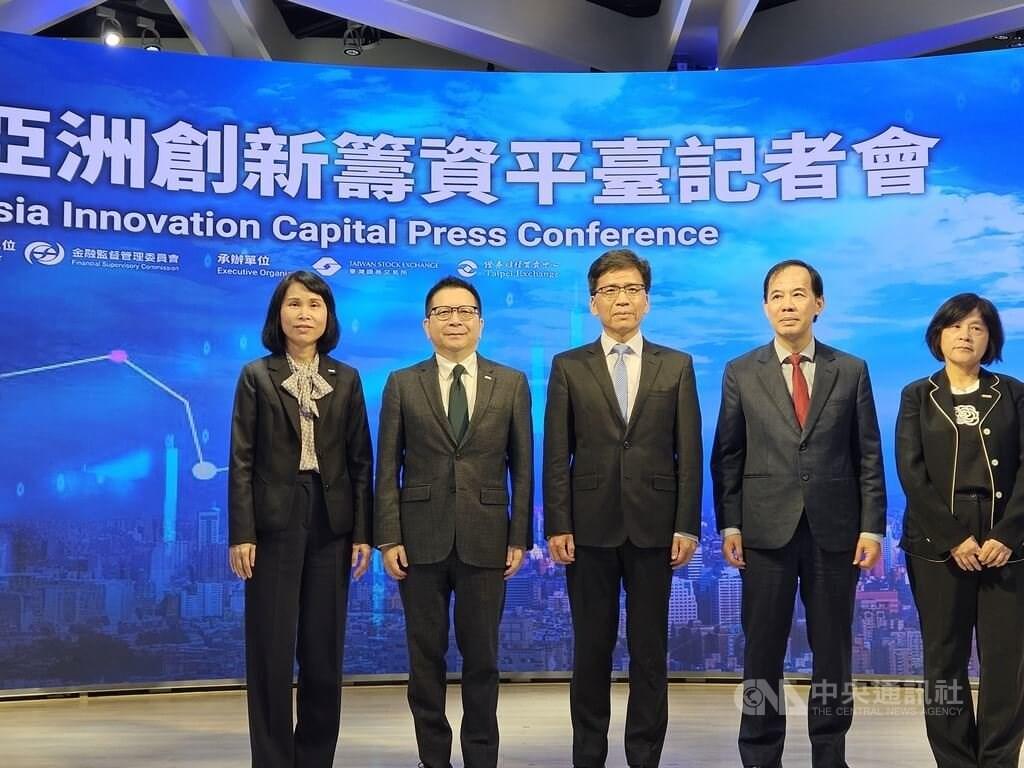After outlining its ambition to transform Taiwan's capital market into an "Asian Nasdaq," the Taiwan Stock Exchange Corp (TWSE) yesterday announced it would ease rules governing listed companies in an effort to attract more foreign start-ups.
With President William Lai (賴清德) and Premier Cho Jung-tai (卓榮泰) having vowed to build Taiwan into an Asia NASDAQ and the Financial Supervisory Commission (FSC) committed to making the country into a major fundraising platform, the exchange will relax its rules, with an initial focus on startups from Southeast Asia and the US Silicon Valley, TWSE president Edith Lee (李愛玲) told reporters.
The combined market value of the local main board and the over-the-counter (OTC) market hit NT$90 trillion (US$2.93 trillion) at the end of last month, the eighth largest in the world, with the semiconductor industry accounting for 48 percent of total market capitalization, Lee said.

Photo: CNA
The FSC has a vision to leverage Taiwan's technology advantage to boost the local capital market's global competitive edge, she added.
Among the rules to be eased by the TWSE, listed foreign companies where the major shareholder controls a more than 30 percent stake, but involves no capital provided by China, Hong Kong or Macau, will be exempted from the requirement to establish a board of directors on which Taiwan nationals account for more than half, the exchange said.
However, such companies will be required to appoint at least two Taiwan nationals as independent board members, it added.
Meanwhile, mutual funds will be allowed to use the same requirements to buy stocks listed on the Taiwan Innovative Board (TIB) as when currently buying stocks listed on the main board in terms of investment amounts, while investors are allowed to buy and sell multi-asset exchange-traded funds (ETF) that track stocks listed on the TIB, the exchange said.
The TIB accommodates stocks, which have a limited capital size or still incur losses but have a promising future, to raise funds for growth, according to the TWSE. An ETF refers to investment funds that trade like shares and can track anything from a single stock to a broad market index.
Whenever a company that meets profit requirements set by the main board but chooses to seek a listing on the TIB, the rules governing the period for share depository and clearing will be shortened from two years to one year, while rules governing underwriting and accounting reviews will also be eased, the exchange said.
Companies listed on the main board, the OTC market, or the TIB will be allowed to migrate to other boards after a minimum of one year as long as they meet the listing requirements of the board they seek, it added.
The TWSE did not disclose when the new rules will come into effect.
In addition to the rule relaxation, the TWSE and the Taipei Exchange, which runs the OTC market, will integrate resources to help companies in the industries designated by the government to launch a stock listing.
Companies are eligible to receive assistance if they operate in the fields of semiconductors, artificial intelligence (AI), AI of Things (AIoT), green energy and environmental protection, robotics, cloud services, smart transportation, smart healthcare, biotech, cybersecurity, next-generation communications, drone, and national defense and aviation, the TWSE said.

Nvidia Corp chief executive officer Jensen Huang (黃仁勳) on Monday introduced the company’s latest supercomputer platform, featuring six new chips made by Taiwan Semiconductor Manufacturing Co (TSMC, 台積電), saying that it is now “in full production.” “If Vera Rubin is going to be in time for this year, it must be in production by now, and so, today I can tell you that Vera Rubin is in full production,” Huang said during his keynote speech at CES in Las Vegas. The rollout of six concurrent chips for Vera Rubin — the company’s next-generation artificial intelligence (AI) computing platform — marks a strategic

REVENUE PERFORMANCE: Cloud and network products, and electronic components saw strong increases, while smart consumer electronics and computing products fell Hon Hai Precision Industry Co (鴻海精密) yesterday posted 26.51 percent quarterly growth in revenue for last quarter to NT$2.6 trillion (US$82.44 billion), the strongest on record for the period and above expectations, but the company forecast a slight revenue dip this quarter due to seasonal factors. On an annual basis, revenue last quarter grew 22.07 percent, the company said. Analysts on average estimated about NT$2.4 trillion increase. Hon Hai, which assembles servers for Nvidia Corp and iPhones for Apple Inc, is expanding its capacity in the US, adding artificial intelligence (AI) server production in Wisconsin and Texas, where it operates established campuses. This

US President Donald Trump on Friday blocked US photonics firm HieFo Corp’s US$3 million acquisition of assets in New Jersey-based aerospace and defense specialist Emcore Corp, citing national security and China-related concerns. In an order released by the White House, Trump said HieFo was “controlled by a citizen of the People’s Republic of China” and that its 2024 acquisition of Emcore’s businesses led the US president to believe that it might “take action that threatens to impair the national security of the United States.” The order did not name the person or detail Trump’s concerns. “The Transaction is hereby prohibited,”

Garment maker Makalot Industrial Co (聚陽) yesterday reported lower-than-expected fourth-quarter revenue of NT$7.93 billion (US$251.44 million), down 9.48 percent from NT$8.76 billion a year earlier. On a quarterly basis, revenue fell 10.83 percent from NT$8.89 billion, company data showed. The figure was also lower than market expectations of NT$8.05 billion, according to data compiled by Yuanta Securities Investment and Consulting Co (元大投顧), which had projected NT$8.22 billion. Makalot’s revenue this quarter would likely increase by a mid-teens percentage as the industry is entering its high season, Yuanta said. Overall, Makalot’s revenue last year totaled NT$34.43 billion, down 3.08 percent from its record NT$35.52